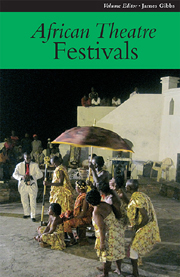Book contents
- Frontmatter
- Contents
- Notes on Contributors
- Obituary of Efo Kodjo Mawugbe
- Introduction by James Gibbs
- Festivals as a Strategy for the Development of Theatre in Zimbabwe 1980–2010
- The Legacy of Festac '77
- Festac, Month by Month & Soyinka's Involvement
- The Dakar Festivals of 1966 & 2010
- African Renaissance between Rhetoric 30 & the Aesthetics of Extravagance FESMAN 2010 – Entrapped in Textuality
- Theatre Programme for FESMAN & Commentary
- The Pan-African Historical Theatre Festival (PANAFEST) in Ghana, 1992–2010
- PANAFEST through the Headlines
- International Festivals & Transnational Theatre Circuits in Egypt, 1988–2010
- The Jos Theatre Festival 2004–2011
- The Grahamstown Festival & the Making of a Dramatist An interview with ANDREW BUCKLAND
- Playscript
- Book Reviews
Theatre Programme for FESMAN & Commentary
Published online by Cambridge University Press: 05 May 2013
- Frontmatter
- Contents
- Notes on Contributors
- Obituary of Efo Kodjo Mawugbe
- Introduction by James Gibbs
- Festivals as a Strategy for the Development of Theatre in Zimbabwe 1980–2010
- The Legacy of Festac '77
- Festac, Month by Month & Soyinka's Involvement
- The Dakar Festivals of 1966 & 2010
- African Renaissance between Rhetoric 30 & the Aesthetics of Extravagance FESMAN 2010 – Entrapped in Textuality
- Theatre Programme for FESMAN & Commentary
- The Pan-African Historical Theatre Festival (PANAFEST) in Ghana, 1992–2010
- PANAFEST through the Headlines
- International Festivals & Transnational Theatre Circuits in Egypt, 1988–2010
- The Jos Theatre Festival 2004–2011
- The Grahamstown Festival & the Making of a Dramatist An interview with ANDREW BUCKLAND
- Playscript
- Book Reviews
Summary
Baaba Maal's recommendation seems to have been crucial in the appointment of Kwame Kwei Armah as FESMAN's artistic director. This emerges from a newspaper article by Hannah Pool that incorporated extensive quotations from a Skype interview conducted while Armah was in Senegal for the Festival. Armah told Pool about the opportunities and challenges offered by his role in the Festival and hinted at some of the issues that confronted him. The appointment meant that he was working on a very much larger scale than he was used to and in a very different context. His participation led to some criticism – see above – and gave him – see below – considerable satisfaction.
Armah brought out the ‘large scale’ quality of the challenge he had taken up when he told Pool: ‘The last thing I directed (2008 Let There Be Love) had seven actors, and here I am directing a stadium, with 1,000 performers and with 40,000 people cheering’. He drew attention to the quality of the performers, listed in Niang's article, who took part in the opening ceremony.
He responded with enthusiasm to the Festival's theme of Renaissance. It was his view, as quoted by Pool, that, even in Britain, ‘there is a black British renaissance – whether it's fashion with Ozwald Boateng, in architecture with David Adjaye, or in the visual arts with Yinka Shonibare or Chris Ofili.
- Type
- Chapter
- Information
- African Theatre 11: Festivals , pp. 39 - 44Publisher: Boydell & BrewerPrint publication year: 2012



